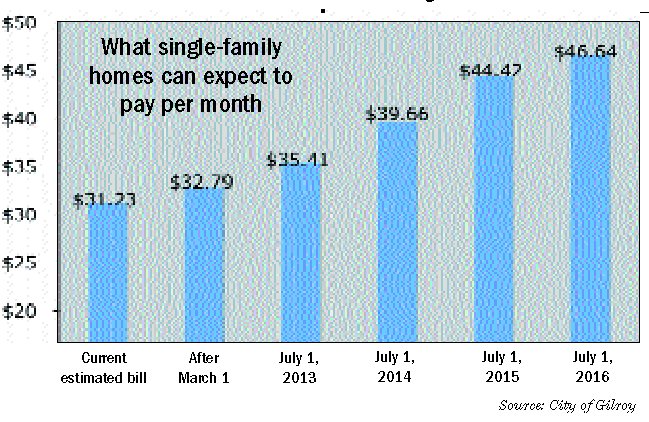Gilroy residents and business owners have until Monday to formally protest the city’s plans to raise sewer service rates more than 40 percent over the next five years – a necessary spike, officials say, that will fund anticipated rising costs in maintenance and wastewater operations.
“You know, if you’d like the toilet to flush, it might be worth a few extra bucks,” said Gilroy City Councilman Bob Dillon, chairman of the South County Regional WasteWater Authority board.
“I’m not happy about the rates going up, but I know that they have to,” Dillon added.
The City Council will hold a public hearing at 6 p.m. Monday at City Hall to decide whether to OK the increases. But if 51 percent of the city’s wastewater customers mail in protest letters by then, the rate hikes – regardless of what the Council decides – will not be approved, according to the city.
That means more than half of the owners of 13,097 properties that were sent notices in December must protest by Monday to stop the increases. The city provides sewer service to all residents and businesses within Gilroy’s city limits.
The city has received just 16 letters of protest, according to the City Clerk’s office. Property owners were mailed notices in their water bills, but Dillon thinks residents won’t come near the majority needed to stop the cost spikes.
“I can’t see that threshold being met,” Dillon said. “I think most people will understand.”
While the average single-family home now pays just over $31 a month for wastewater services – a flat rate that’s then combined with how much drinking water is used (charges are based on use) to formulate your monthly water bill – the figure will rise several dollars per year beginning in March, according to the city.
By 2016, the average homeowners will pay more than $46 each month to flush their toilets.
Written protests must be submitted in person to the City Clerk’s office or mailed to City Hall at 7351 Rosanna Street in Gilroy, with attention marked “Public Hearing on Rate Increases.”
Individuals can also submit protests at the Monday public hearing if they are delivered before that meeting’s public comment period ends, according to the city.
The city says letters of protest must include five items: property owner name, specific rate increases being protested, property location, evidence of ownership (copy of a city bill, for example) and signature.
Protests submitted via email will not be accepted, City Finance Director Christina Turner said, because property owners’ signatures must be verified for the protests to count.
Turner said this is done “to ensure that the city only receives authorized protests.”
Residents will be allowed to offer comments during the hearing, but their statements will not qualify as official protests unless accompanied by formal written ones, Turner said.
The Santa Clara Valley Water District board of directors voted Tuesday not to protest the rate increases, which will affect 63 district-owned parcels within Gilroy’s city limits, water district public information officer Marty Grimes said.
Grimes said there was no discussion prior to the vote.
“It was not even taken off the consent calendar, so that should tell you something,” he said.
The city is proposing “maximum” rates for wastewater, which Turner says can be imposed each year to fund current and projected jumps in operations and maintenance costs, pay for repairs and upgrades and assure compliance with new laws and requirements.
“The city will keep the community apprised of the status of the city’s wastewater revenue needs over the next five years and the city will provide written notice of any wastewater rate adjustments not less than 30 days before the effective date of the adjustment,” the city said in a notice to property owners.
The city’s wastewater is collected and treated at a plant operated by the South County Regional Wastewater Authority – a partnership of the City of Gilroy and the City of Morgan Hill.
A portion of the wastewater revenues collected by the city of Gilroy will be used for payment to the SCRWA. In addition, wastewater rates support infrastructure investments, such as necessary system improvements, Turner said.
“Multi-year rate increases are proposed to provide revenue reliability, which is critical to securing favorable financing rates for wastewater improvement projects,” she said. “The ability to reduce borrowing costs may reduce the impact on wastewater rates.”














